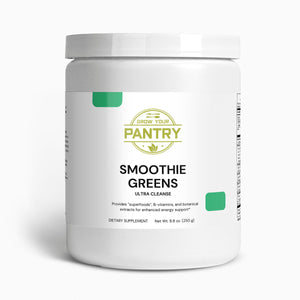Is Store Bought Sauerkraut Good For You?

Store-bought sauerkraut is considered to be less nutritious compared to homemade sauerkraut due to the processing. Most store-bought sauerkraut varieties undergo pasteurization during canning, and this eliminates all live probiotic content. This guide seeks to look into the health benefits of sauerkraut and if they weigh more than the downsides of consuming store-bought sauerkraut.
What Is Sauerkraut?
Sauerkraut refers to fermented cabbages that are stored under a controlled environment to allow yeast and bacteria to ferment the sugars in the vegetables naturally. The bacteria and yeast establish an acidic environment that prevents rotting and infestation of harmful cultures. The result is well-preserved cabbages enriched with probiotics.
How Is Store Bought Sauerkraut Different From Homemade Sauerkraut?
Fermentation Time - Store-bought sauerkraut undergoes a shorter fermentation time compared to homemade sauerkraut, which takes at least 20 days to ferment. As a result, the sauerkraut contains a lower probiotic count.
Pasteurization - Most store-bought varieties are often treated with heat to eliminate any bacteria culture in the fermented cabbages before they get canned. While this process serves to protect those with compromised immune systems, it deprives the sauerkraut of all its probiotic goodness. Homemade sauerkraut does not require pasteurization, and it, therefore, contains billions of live probiotics that continue to thrive in the sauerkraut during storage.
Preservatives And Additives - Store-bought sauerkraut may contain preservatives and additives, which are added to increase the shelf life and flavor of the sauerkraut. Sustained consumption of artificial preservatives can weaken the heart tissues. Homemade sauerkraut, on the other hand, does not contain any preservatives or additives, just natural probiotics. Reference: link.
Are There Less Probiotics In Store Bought Sauerkraut?
Most store-bought sauerkraut varieties will always contain fewer probiotics compared to homemade sauerkraut. This is because of pasteurization, which uses heat treatment to eliminate harmful as well as useful bacteria culture. While some firms do add back probiotic supplements to the sauerkraut after pasteurization, it is not as healthy as homemade sauerkraut.
What Are Probiotics?
Probiotics are live bacteria and yeast cells that are considered to be important when consumed. Probiotics are considered to be good bacteria that help restore the gut bio balance and reduce the population of harmful bacteria in the digestive system.
Natural Probiotics Vs. Added
Natural probiotics grow and spread naturally, depending on the environment and availability of food. Natural probiotics are often found on raw food and do not require to be propagated. Instead, they will multiply on their own during fermentation. Added probiotics are artificially propagated in labs and grown into large numbers, after which small amounts of the culture gets added to various foods. Added probiotics are selectively propagated, meaning that only the specific variety of bacteria gets to be grown.
Is Store Bought Sauerkraut Pasteurized?
Most store-bought sauerkraut varieties are pasteurized, make sure to check the label carefully to see if the manufacturer has indicated if the product is pasteurized.
What Is Pasteurization?
Pasteurization is the process of sterilizing food during which mild heat is used to treat the food and eliminate harmful germs. After pasteurization, the food is then packaged into airtight containers to avoid reintroduction of the harmful cultures.
What Effect Does Pasteurization Have On Sauerkraut?
Pasteurization effectively eliminates any growing bacteria and yeast cultures in the sauerkraut, thus reducing its probiotic benefits. Pasteurization, however, does not affect the nutritional content as the heat used is not strong enough to denature the nutrients.
3 Types Of Store Bought Sauerkraut
Pickled Cabbages - Store-bought sauerkraut can be marketed as pickled cabbages, although most pickled cabbage brands do not rely on fermentation. Pickled cabbages also include additional flavoring ingredients and are often sold in pickling jars and cans suspended in the pickling liquid. This ensures that the pickled cabbages retain their flavor, and no harmful cultures can grow within the pickled cabbages.
Pasteurized Sauerkraut - This is sauerkraut that has undergone heat treatment after fermentation in order to eliminate harmful bacteria and yeast cultures. This is the most common sauerkraut variety. In order to make up for the lost probiotics, some manufactures often opt to supplement the food with added probiotics, which don't always offer the same health benefits as natural probiotics.
Raw Unpasteurized Sauerkraut - This is just like homemade sauerkraut, only that it's been packaged. Raw unpasteurized sauerkraut can be found either submerged in its pickling liquid or drained and frozen in packets. Raw unpasteurized sauerkraut contains the full benefits of probiotics and the nutrients found in the cabbages.
Where To Buy Unpasteurized Sauerkraut
Farmers’ Market
Your local farmer's market is bound to have a couple of homemade sauerkraut sellers. These often rely on locally sourced ingredients to ferment the sauerkraut. Ensure that you store your farmer's market sauerkraut in the fridge immediately to avoid loss of flavor and texture.
Health Food Store
Health food stores are more likely to stock up on sauerkraut. Sauerkraut is often found near the frozen foods sections and should be stored accordingly; if it was kept in a freezer in the store, you should store it in the freezer back home, and if it was in the fridge then it should go into the refrigerator. This ensures that your sauerkraut remains fresh up to its expiry by date.
Online
The best place to buy sauerkraut online is on Amazon.
Common Questions
What Is The Best Store-Bought Sauerkraut?
The best store-bought sauerkraut should be raw and unpasteurized so as to provide the required health benefits.
What Brand Of Sauerkraut Has Probiotics?
All sauerkraut brands that have been marked as unpasteurized are considered to be rich in natural probiotics.
Is Refrigerated Sauerkraut Better Than Canned?
Refrigerated sauerkraut still contains live probiotics. It is therefore considered to be better than canned sauerkraut as the canning process often involves pasteurization.
Is It Ok To Eat Sauerkraut Every Day?
It's perfectly fine to eat sauerkraut on a daily basis. If it's your first time trying sauerkraut, start with small amounts so that your body gets acclimatized to the increased probiotic consumption.
Can I Eat Sauerkraut Out Of The Jar?
Yes, raw sauerkraut can be eaten straight out of the jar, but if you find the taste to be too strong, you can always incorporate the sauerkraut into another dish.
How Much Sauerkraut Should I Eat Daily?
Regularly consuming small amounts of sauerkraut, preferably 7 to 10g has an overall positive effect on many patients. Get in touch with your doctor and enquire about the best dose to rely upon.
Is Sauerkraut High In Vitamin C?
A 100 g serving of sauerkraut contains 14.7 mg of vitamin C.
Does Homemade Sauerkraut Need To Be Refrigerated?
Homemade sauerkraut does not require to be refrigerated unless you intend to store it for over a month.
Is Sauerkraut Anti Inflammatory?
Sauerkraut is rich in probiotics that have anti-inflammatory capabilities. Consuming sauerkraut, therefore, reduces inflammation.
Does Sauerkraut Make You Poop?
Yes, sauerkraut improves the overall digestive system, and its dietary fiber content makes it much easier to bulk and pass stool.
What Can I Eat Sauerkraut With?
Sauerkraut can be matched with sausages, beef, pork, and even other vegetables.







I have heard that good sauerkraut is best after 3 or 4 years. If refrigerators slow bacterial growth what is the point of using them?
Lovely
I am told that one can repopulate the probiotics in pasteurized sauerkraut by pouring in the left over liquid from an unpasteurized product – and letting it sit. If this is true it would save some money.
Thanks
Hi.
Thanks for your article, unfortunately i don’t think you answered the articles heading very clearly. As i still don’t know from your article if ‘shop bought sauerkraut’ is good for you or not.